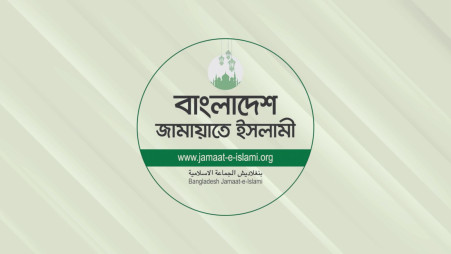Political parties should maintain decorum while speaking about other parties: Jamaat on Nahid’s remarks
Azad further observed that when a party or individual loses consistency or political position, they can say anything

The Bangladesh Jamaat-e-Islami has said that all political parties should maintain decorum and etiquette while making statements about other parties.
Jamaat's Assistant Secretary General, Hamidur Rahman Azad, made the remarks in response to comments made about Jamaat by Nahid Islam, convener of the National Citizen Party (NCP), today (19 October).
Speaking to BBC Bangla, Azad said, "It is better to comment on any party while maintaining the etiquette. We must move away from the politics of the blame game. Because that was the old political trend.
He added, "We wanted to move away from that old pattern and say goodbye to the politics of blaming."
Jamaat wants to establish a more positive and constructive political environment, the Jamaat leader said.
Azad further observed that when a party or individual loses consistency or political position, they can say anything.
Commenting on the NCP, Azad said, "Those who speak of inspiring the nation, upholding the spirit of the July Uprising, and building a new Bangladesh should approach politics with a positive mindset."
He noted that Nahid's remarks reflected an outdated political culture.
"That is why, the NCP should have acted with more responsibility and courtesy while making such remarks," Azad added.
Earlier in the day, NCP Convener Nahid Islam had described Jamaat-e-Islami's recent push for a Proportional Representation (PR) system in the upcoming election as a "calculated political deception."
In a post on his verified Facebook account, Nahid said the "so-called PR movement" launched by Jamaat was "deliberately designed to derail the Consensus Commission's reform process and divert national dialogue" from core constitutional reforms.
He wrote that the demand for an Upper House based on proportional representation was originally conceived as a constitutional safeguard.
"We sought to build a movement around such foundational reforms and to establish the legal framework of the July Charter through broad-based national consensus," he stated.
Nahid alleged that Jamaat and its allies "hijacked this agenda, reduced it to a technical PR issue, and used it as a bargaining tool for narrow partisan interests."
He added, "Their motive was never reform; it was manipulation."
He further said Jamaat had never meaningfully participated in the reform discussions before or after the July Uprising, nor had it presented any constitutional vision or commitment to democratic principles.



 Keep updated, follow The Business Standard's Google news channel
Keep updated, follow The Business Standard's Google news channel

















